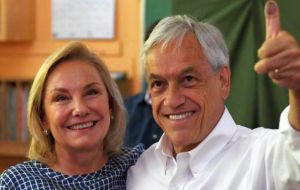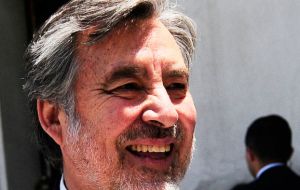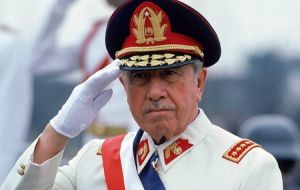MercoPress. South Atlantic News Agency
Piñera and Guillier to a much disputed runoff; far right and far left parties will be decisive
 “Tonight we have achieved a great electoral result and above all because we have opened the doors which will lead us to better times,” Piñera told supporters.
“Tonight we have achieved a great electoral result and above all because we have opened the doors which will lead us to better times,” Piñera told supporters.  Guillier, an independent supported by President Bachelet, beat off a stiff challenge from an unheralded far-left candidate, Beatriz Sanchez, for the second round place
Guillier, an independent supported by President Bachelet, beat off a stiff challenge from an unheralded far-left candidate, Beatriz Sanchez, for the second round place  Analysts said Piñera will have to appeal to the far right for support in the runoff, after extreme right-candidate Jose Antonio Kast took 7.9% of the votes.
Analysts said Piñera will have to appeal to the far right for support in the runoff, after extreme right-candidate Jose Antonio Kast took 7.9% of the votes.  The legacy of ex dictator Augusto Pinochet and his 17 year rule still generates a strong divide in Chile, one of the region's most conservative countries.
The legacy of ex dictator Augusto Pinochet and his 17 year rule still generates a strong divide in Chile, one of the region's most conservative countries. Conservative Sebastian Piñera, who held a commanding lead in Chile's first round of presidential voting, and leftist former TV journalist Alejandro Guillier will contest a runoff next month. Ex-president Piñera had a 36.6% lead to Guillier's 22.7% with more than 98% of the votes, --of a very low turnout, 46.6%--, counted after the first round.
“Tonight we have achieved a great electoral result and above all because we have opened the doors which will lead us to better times,” Piñera told his triumphant supporters.
Guillier, an independent supported by President Michelle Bachelet's Socialist party, beat off a stiff challenge from an unheralded far-left candidate, Beatriz Sanchez, for the second runoff place. She managed to capture 20.3% of the vote.
Piñera, a 67-year-old billionaire who was president from 2010 to 2014, had been the clear favorite going into Sunday's first round. The second round is set for December 17.
“The result is very similar to the one we had in 2009, and in 2009 we won the election, and we managed to get our country up and running,” said Piñera, who campaigned on reviving an economy that has suffered years of weak growth.
Guillier, a 64-year-old news anchor turned Senator, said Chile “wants another way, and has expressed that in the vote,” which gives him a platform to build on in the second round if he can unify a fragmented left.
“The result completely reconfigures the Chilean political landscape,” University of Santiago analyst Rene Jara said pointing out that both far-left and far-right candidates polled more strongly than expected among the eight presidential candidates.
Sanchez, 46, a seasoned journalist who entered politics only in March, polled more than 1.2 million votes as a representative of the anti-austerity Frente Amplio party “Chile wants change and said it today by voting,” she said.
Jara said Sanchez's vote had given her party “very strong negotiating power for the second round.” Although her party had been reluctant to pledge support for Guillier, “they are obliged to do so because they will not be responsible for a return of Piñera to power.”
Analysts said Piñera will be forced to appeal to the far right for support in the second round, after extreme right-candidate Jose Antonio Kast polled strongly, taking 7.9% of the votes.
Bachelet, who was also Chile's first woman president, hugged and took photographs with female supporters before casting her ballot in Santiago. ”It is important that people come out and vote (for a candidate) because they feel they represent what they want for Chile,” she said, predicting a second round.
Chile's constitution bans consecutive terms for presidents, but re-election after skipping a term is permissible.
Bachelet herself led the conservative South American country -- Latin America's fifth-largest economy -- from 2006 to 2010 and then was re-elected to replace Piñera in 2014.
Compulsory voting was dropped in 2012. Since then, a growing number of Chile's 14 million eligible voters have decided to stay away from voting booths, many of them frustrated by what is perceived as extended mistrust with the political system involved in corruption events, and the concentration of wealth.
Besides Chile is still recovering from the legacy of over half a century ago when an elected Marxist oriented government was debilitated by its own extreme groups that wanted to impose ideology by force, triggering a reaction from the military led by General Augusto Pinochet who ruled with an iron fist for 17 years, 1973/1990.
Pinochet political legacy and constitution, which requires special majorities for amendments has helped boost the economy but to a great extent deepened the divide, in a country still very conservative minded.




Top Comments
Disclaimer & comment rules-

Read all commentsThe lessons from Brazil:
Nov 21st, 2017 - 12:26 pm 0https://www.cato.org/blog/corruption-rule-law-could-brazil-be-envy-latin-america
Commenting for this story is now closed.
If you have a Facebook account, become a fan and comment on our Facebook Page!